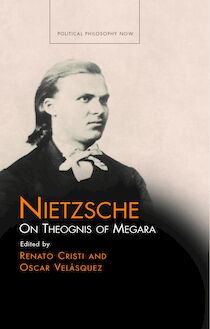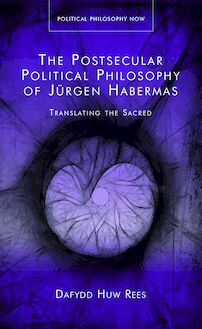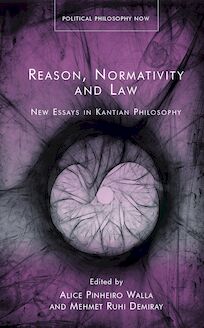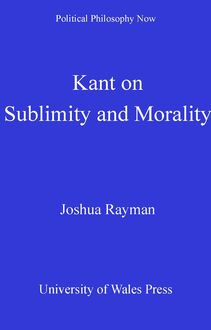Nietzsche , livre ebook
104
pages
English
Ebooks
2015
Vous pourrez modifier la taille du texte de cet ouvrage
Obtenez un accès à la bibliothèque pour le consulter en ligne En savoir plus
Découvre YouScribe en t'inscrivant gratuitement
Découvre YouScribe en t'inscrivant gratuitement
104
pages
English
Ebooks
2015
Vous pourrez modifier la taille du texte de cet ouvrage
Obtenez un accès à la bibliothèque pour le consulter en ligne En savoir plus
Publié par
Date de parution
11 novembre 2015
Nombre de lectures
2
EAN13
9781783168026
Langue
English
The topic chosen by Nietzsche for his Pforta dissertation was Theognis, his life in Megara, his lyrical production, and his views on the gods, morality and politics. Nietzsche saw Theognis as the intellectual champion of the defeated Megarian aristocracy, who sought to preserve the Dorian spirit and its noble virtues. The interests that guided Nietzsche transcended scientific philology and embraced a concern for the social and political context he adumbrated in the Theognidea. The editors of this volume refer to this novel standpoint as constituting a rudimentary political philology, showing that Theognis’ aristocratism determined and guided Nietzsche’s critique of the moral point of view and his conception of an aristocratic state.
Introduction: Nietzsche’s Aristocratism by Renato Cristi
Part I: Theognis and Nietzsche’s Aristocratism
Part II. Nietzsche’s Aristocratic Ethics: Command and Obedience
Part III. Nietzsche’s Aristocratic Radicalism: Charismatic Authority
Nietzsche, On Theognis of Megara (De Theognide Megarensi)
Translated by Oscar Velásquez
Nietzsche, Studies on Theognis (Studien zu Theognis)
Translated by Manuel Knoll & Renato Cristi
Publié par
Date de parution
11 novembre 2015
Nombre de lectures
2
EAN13
9781783168026
Langue
English
Chief Editor of the Series: Howard Williams, Aberystwyth University, Wales
Associate Editors: Wolfgang Kersting, University of Kiel, Germany Steven B. Smith, Yale University, USA Peter Nicholson, University of York, England Renato Cristi, Wilfrid Laurier University, Waterloo, Canada
Political Philosophy Now is a series which deals with authors, topics and periods in political philosophy from the perspective of their relevance to current debates. The series presents a spread of subjects and points of view from various traditions, which include European and New World debates in political philosophy.
Also in series Hegel and Marx After the Fall of Communism David MacGregor
Politics and Teleology in Kant Edited by Paul Formosa, Avery Goldman and Tatiana Patrone
Identity, Politics and the Novel: The Aesthetic Moment Ian Fraser
Kant on Sublimity and Morality Joshua Rayman
Politics and Metaphysics in Kant Edited by Sorin Baiasu, Sami Pihlstrom and Howard Williams
Nietzsche and Napoleon: The Dionysian Conspiracy Don Dombowsky
POLITICAL PHILOSOPHY NOW
Nietzsche
On Theognis of Megara
Renato Cristi and Oscar Velásquez
UNIVERSITY OF WALES PRESS • 2015
© Renato Cristi and Oscar Velásquez, 2015
All rights reserved. No part of this book may be reproduced in any material form (including photocopying or storing it in any medium by electronic means and whether or not transiently or incidentally to some other use of this publication) without the written permission of the copyright owner except in accordance with the provisions of the Copyright, Designs and Patents Act 1988. Applications for the copyright owner’s written permission to reproduce any part of this publication should be addressed to the University of Wales Press, 10 Columbus Walk, Brigantine Place, Cardiff, CF10 4UP.
www.uwp.co.uk
British Library Cataloguing-in-Publication Data A catalogue record for this book is available from the British Library.
ISBN 978-1-78316-800-2 eISBN 978-1-78316-802-6
The rights of Renato Cristi, Oscar Velásquez and Manuel Knoll to be identified as authors and translators in respect of this work have been asserted in accordance with sections 77, 78 and 79 of the Copyright, Designs and Patents Act 1988.
Add cover image credit to imprint page: Cover image: Friedrich Nietzsche in 1864. © INTERFOTO / Alamy Stock Photo.
Contents
List of Abbreviations
Introduction: Nietzsche’s Aristocratism Renato Cristi
Part I Theognis and Nietzsche’s Arisocratism
Part II Nietzsche’s Aristocratic Ethics: Command and Obedience
Part III Nietzsche’s Aristocratic Radicalism: Charismatic Authority
Friedrich Nietzsche On Theognis of Megara (‘De Theognide Megarensi’) Translated by Oscar Velásquez
Friedrich Nietzsche Studies on Theognis (‘Studien zu Theognis’) Translated by Manuel Knoll and Renato Cristi
References
List of Abbreviations AC The Anti-Christ BAW Schriften den Studenten- und Militärzeit 1866–1868 BGE Beyond Good and Evil BT Birth of Tragedy D Daybreak DTM ‘De Theognide Megarensi’ EH Ecce Homo GM On the Genealogy of Morals GS Gay Science GTS ‘Zur Geschichte der Theognideischen Spruchsammlung’ HH Human, All Too Human KGB Kritische Gesamtausgabe. Briefwechsel KSA Sämtliche Werke. Kritische Studienausgabe PTG Philosophy in the Tragic Age of the Greeks SzT ‘Studien zu Theognis’ TI Twilight of the Idols UM Untimely Meditations WP The Will to Power WS The Wanderer and his Shadow Z Zarathustra
Introduction: Nietzsche’s Aristocratism 1
Renato Cristi
Will it ever be possible to solve the puzzle concerning Nietzsche’s attitude towards politics? Did he harbour any political convictions, and if so can they be identified? Was he an anarchist or post-anarchist, a harbinger for democracy, a closet monarchist, a Bonapartist, an avant-garde fascist or a radical aristocrat? Or did he remain tenaciously anti-political throughout his life? 2 This book propounds ‘De Theognide Megarensi’ ( DTM ) as one missing piece of the puzzle. DTM , a text that has barely attracted scholarly attention, was Nietzsche’s valedictorian dissertation at Pforta. It marked the completion of his Gymnasium years, which were devoted mainly to classical philology. Later on, in the Preface to his second Untimely Meditations ( UM ), he rightly claimed that he was ‘a pupil of ancient times, above all the Greek’ ( KSA I, 247). He also admitted that untimeliness was the only purpose and significance of classical philology. By this he meant that classical philology could only attain historical significance if it ‘acted counter to our time and thereby acted on our time and, hopefully, for the benefit of a time to come’ ( KSA I, 247). With this statement he acknowledged that, in his hands, classical scientific philology had turned into what I would describe as political philology. In DTM , the earliest of his untimely writings, Nietzsche may be said to have acted counter to his time. He understood the Greek elegiac poet Theognis to be a child of his time and, in this much, he moved counter to scientific philology. Theognis’ elegies attained significance only when understood as a response to his political circumstances. In its own untimeliness this early text by Nietzsche may be seen as an early manifestation of Zukunftsphilologie (cf. Porter, 2000: 226–7) and serve to illuminate Nietzsche’s later ethical and political concerns. The feelings that his early acquaintance with Theognis aroused in him would remain throughout his life. He owed to Theognis his own aristocratism, 3 to which he adhered in order to act contrary to his own time and for the benefit of a time to come. After all, Nietzsche considered the task of philologists to be to achieve a ‘better understanding of their own epoch by means of classical antiquity’ (Nietzsche, 1966: III, 325; emphasis in the original).
Theognis’ life in Megara, his lyrical production and his views on the gods, morality and politics were the theme of DTM (1864), which Nietzsche wrote when he was nineteen years old. A few years later, he resumed his research as a student at Leipzig, and in 1867 the finished product became his first publication – ‘Zur Geschichte der Theognideischen Spruchsammlung’ ( GTS ). This was a text in which he put to use his formidable philological talents in attempting to decipher the enigma surrounding the redaction of the Theognidean corpus, its repetitions, fragmentation and multiple interpolations. But, it seems to me, Nietzsche’s ultimate aim was once more political and not strictly philological. In 1826, Friedrich Gottlieb Welcker published his edition of the Theognidea and supported the traditional view that, since this was no more than a collection of aphorisms, Theognis ought to be considered a gnomic poet (cf. Welcker, 1826: lxxi). Because the fragments lacked consistency of content and tone, no unified ethical viewpoint or political position could be attributed to him. Nietzsche, in contrast, thought that a unified portrait of Theognis’ life and times could be drawn by means of a more systematic reading of the fragments, and that this would help to elucidate Theognis’ ethics and politics. Recognition of his aristocratism and his reaction to the historic collapse of Megara’s aristocratic hegemony during the sixth century provided the social and political context that would allow a sound interpretation of Theognis’ writings.
Gottfried Bernhardy, whose work was cited in Nietzsche’s DTM , wrote that Theognis ‘experienced all the misfortunes of his compatriots, and his verses preserve a historical monument that contains not merely the only complete report of the political revolution ( Staatsumwälzung ) at the time, but [he] also makes unambiguously audible the political beliefs of the Dorian aristocrats in honourable though jagged words’ (Bernhardy, 1877: II, 524). The revolution mentioned by Bernhardy refers to the political turbulence that took effect during the seventh and sixth centuries culminating with the world historical debut of democracy on the Greek stage. As G. E. M. de Ste Croix acknowledged, ‘democracy had never before been established in a thoroughly civilised society, and the Greek poleis which developed it had to build it up from the very bottom’ (de Ste Croix, 1983: 281; cf. Schweizer, 2007: 355). The power vacuum left behind by traditional aristocratic governments was for decades filled by the dictatorships of the Tyrants that lasted until proper democratic institutions could be devised and put in place. Nietzsche took notice of Theognis’ reaction to these events. He saw Theognis as the intellectual champion of the defeated Megarian aristocracy, who sought to preserve the Dorian spirit and its noble virtues, and who also vented his spite and contempt against the rabble that now ruled his city. Though Nietzsche shared Theognis’ fear of democracy, he also realized that Theognis’ personality and character did not embody the old Dorian aristocratic ethos shattered by the revolution. He reported Goethe’s portrait of Theognis as ‘a sad (un-) Greek hypochondriac’ ( DTM , 139), and this could explain why Theognis was not mentioned in his books until very late in 1887.
In DTM , Nietzsche dealt with the life and times of the poet. Later, Nietzsche characterized Theognis, in the only reference to him in his published work, as the ‘mouthpiece’ of the Greek nobility ( GM I, 5). For this reason an examination of DTM , a translation of which is published in this book, is well-suited to engage in an exploration of Nietzsche’s aristocratism. I devote Part I to studying Theognis’ aristocratism and its radical bent, and how it determined Nietzsche’s own political views. In §1, I show how the interests that guided Nietzsche’s dissertation transcended scientific philology and embraced a concern for the social and political context he had adumbrated in the Theognidea . I refer to this novel standpoint as constituting a rudimentary political philology. Nietzsche followed Theognis as he lived through t














